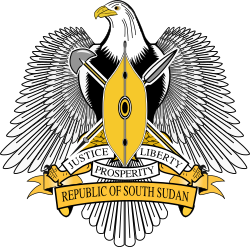Reconstituted Transitional National Legislative Assembly of South Sudan | |
|---|---|
 | |
| Type | |
| Type | |
| History | |
| Founded | 2011 |
| Leadership | |
Speaker | |
First Deputy Speaker | |
Clerk | |
| Structure | |
| Seats | 550 |
 | |
Political groups |
|
| Elections | |
Coming soon:
| |
Last election | 11–15 April 2010 (elections to the preceding Southern Sudan Legislative Assembly) |
Next election | 22 December 2026 |
| Meeting place | |
| Ministries Complex Juba South Sudan | |
| Website | |
| http://nla.gov.ss/ | |
 |
|---|
| Constitution |
The Reconstituted Transitional National Legislative Assembly is the lower house of the Transitional National Legislature of South Sudan.